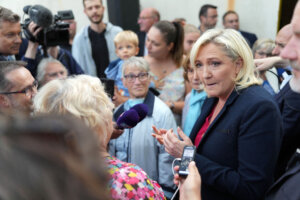Why the latest political debacle in France may send tremors around the world
The public that reelected Emmanuel Macron less than two months ago already seems to be experiencing buyer’s remorse

France’s President Emmanuel Macron waves as he leaves after casting his vote in the second stage of French parliamentary elections on June 19, 2022. Photo by Getty Images
Rocked by a succession of tremors over the past five years, France’s political landscape has just been convulsed once more. On Sunday, citizens who bothered to go to the polls — more than half decided to stay home or go to the beach — announced they were experiencing voter’s remorse. Having reelected Emmanuel Macron to the presidency less than two months ago, they had changed their minds.
Yesterday’s second and final round of legislative elections underscored this sentiment. For the first time in the history of the country’s Fifth Republic, founded by Charles de Gaulle in 1958, an incoming president has been denied a parliamentary majority. Ensemble!, the centrist coalition mobilized behind Macron, earned the exclamation mark in its name Sunday. While it was widely expected to win at least the minimum number of 289 seats to have an absolute majority in the National Assembly, its final count was a mere 246.
Apart from the coalition needing to rebrand itself — “Airplane!” is one possibility, while “Merde!” is another — what are the lessons of this election?
First, that merde was the message the French sent to the country’s traditional political class. Consider those French who decided not to vote. The abstention rate, which was nearly 54 percent, indicates, as the political analyst Jérôme Fourquet suggests, that many voters have concluded that the sacred and republican tradition of going to the polling station has become as pointless as the sacred and Christian tradition of going to the church.
Second, that merde was also the message of those who did go to the polls, overwhelmingly casting their ballots for candidates who do not hail from the traditional political parties. The second largest number of parliamentary seats, 149, was won by the left-wing coalition NUPES. The acronym for the Nouvelle Union Populaire écologique et sociale (New Ecologic and Social People’s Union), it is a label as ungainly to pronounce as its members are uneasy to spend time in one another’s company. It is the work of Jean-Luc Mélenchon — aka the “fiery tribune” — who launched and leads the extreme left-wing movement La France insoumise (Defiant France).
Against all expectations, Mélenchon persuaded the Socialist, Communist and Green parties, long divided by personal ambitions and political values, to join forces with his movement. Agreeing to create a coalition while maintaining their separate identities, what was once a fading and fragmented left has been resurrected as the assembly’s principal opposition party. While it did not win enough seats to form a government, it won more than enough to commandeer key institutional positions, like the assembly’s finance committee, that will make life difficult, if not impossible, for Macron during his renewed five-year mandate.
The third and most ominous takeaway, however, is that the other extreme movement, the illiberal and authoritarian Rassemblement national (National Rally), won 89 seats, a tenfold increase from the eight it had captured in last legislative election in 2017. It is also 10 more seats than those garnered by Defiant France, making it the second-largest party in the new assembly. Yet this event, described as “jamais vu” or never seen, promises to become déjà vu in the years to come.

Led by Marine Le Pen, the RN is the renamed and rebooted Front National, the quasi-fascist movement founded a half-century ago by Le Pen’s father, Jean-Marie Le Pen. When the elder Le Pen bequeathed the FN to his daughter in 2011, she sought to sanitize the movement — described as “dédiabolisation” or de-demonization — by purging the more outrageous pro-Vichy and antisemitic elements who had long roosted there. (Tellingly, this term, coined by Marine Le Pen’s circle, implied that the original demonization of the movement had everything to do with the hostile views of outsiders and nothing to do with the harrowing values of insiders.)
Politicians and political observers, convinced that France was institutionally and ideologically allergic to the values embodied by the Le Pen clan, long regarded this mission as impossible. And yet, Sunday’s election results reveal that as an earlier authoritarian ruler, Napoleon Bonaparte, is said to have quipped, “Impossible n’est pas français.”
In part, it was all too possible thanks to President Emmanuel Macron’s poor management of the elections. By refusing to retire his Jupiterian routine for running the country — best summarized as “l’État, c’est moi” — he alienated most of those who voted for him and his party in 2017. (As for those who voted for him again in 2022, they have yet to take to heart the adage about being burned twice.)
By declaring Mélenchon his principal adversary in the election’s run-up, Macron became a useful idiot for Le Pen’s party. His party’s hair-raising misrepresentations of Mélenchon and his supporters as a clear and present danger to French democracy blurred what had long been a bright red line: that all the parties, from Communists to conservatives, committed to the values of 1789, have a common duty to block the ascent of the extreme right.
Finally, by coupling its demonization of NUPES to its stunning refusal to direct its own supporters to choose the NUPES candidate over the RN candidate in the several dozen cases where they confronted one another the second round, Macron’s coalition helped pave the way to this electoral and moral debacle. As several post-election analyses have made clear, if an Ensemble! candidate did not make it to the second round in their electoral district, most centrist voters did not bother to vote.
But Macron alone is not responsible for Sunday’s results. Le Pen’s success is not an electoral blip because a steadily growing number of French voters no longer consider her party to be a moral blemish. This is partly due to the success of her de-demonization campaign as well as to the failed presidential campaign of Éric Zemmour, whose racist and anti-Islamic declarations made Le Pen appear a paragon of reason and moderation. That deep down she is neither was largely forgotten.
Yet there is, as well, another factor. By dint of the deepening divisions between what the sociologist Christophe Guilluy has called la métropole et la périphérique — post-industrial urban areas plugged into a global economy and de-industrialized rural and exurban regions left in the dust — the RN has become the principal beneficiary of the latter group’s disenchantment with traditional republican politics and traditional values. If Macron and Mélenchon fail to find common ground over the next five years, this divide will become an abyss from which France might never escape.





















